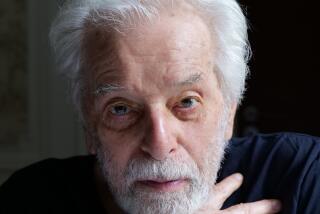‘8 1/2’ Finds Fellini at a High of Creativity
- Share via
It’s hardly an overstatement to say the world lost one of the greats when Federico Fellini died last October after a stroke. In the global film community, he was part of a legendary triumvirate, with Akira Kurosawa and Ingmar Bergman.
All three imprinted their own styles--based on determinedly personal, often odd visions--on their movies. The result was many unique films that come easily to mind, that are studied and restudied and, finally, serve as documents to the progress of this century’s most populist art medium. All three also helped to create a respect in this country for international movies that wasn’t there before.
Fellini undoubtedly made his biggest mark, at least in America, with “8 1/2,” probably the most autobiographical of his works.
The 1963 picture, which opens UC Irvine’s “Off the Beaten Path” series tonight, not only won the Oscar for best foreign film, but Fellini was nominated for best director and best screenplay. He didn’t win either, but just being named was an unusual honor for a foreign filmmaker at the time.
The movie has since been revived in the States repeatedly, both in art houses and on campuses. Any film student can expect to watch it in a darkened classroom and later dissect all of its fantasy-oriented imagery until boredom sets in. Never a boring movie, “8 1/2” carries the responsibility of being a legitimate cinema masterpiece.
A few critics, respected ones, too, haven’t always felt that way. With its hypnotic visuals and free-flowing, jerk-and-startle symbolism, some writers say “8 1/2” is simply meaningless. Fellini, they argue, just startles, he doesn’t inform.
Steadier, more open minds know that’s all hogwash. Fellini may be one of the most indulgent of the great directors (the ever-precise Kurosawa is the least indulgent; Bergman certainly has his flourishes of confusing self-expression), but his film idiosyncrasies are illuminations into his mind, a chaotic and boldly fertile place. Even when they’re pushy and convoluted, his captured images fascinate with pure vivacity.
The impact of “8 1/2” comes not only from the fact that Fellini had reached a mature plateau where his inspirations melded with his technical skill, but because of the personal and professional uneasiness he felt before and during the film’s making. In the 1950s, he had already been hailed as a master, especially after the widespread success of “La Strada,” probably his most poignant picture.
But where to go from there?
“8 1/2” is ultimately a meditation, and frequently an unhappy one, on the limits of creativity, especially when the creator wrestles with the complexities of his own life that keep clouding the horizon. Fellini goes for the big issues--religion and love, death and memory, art and self-awareness.
His alter-ego is Guido (Marcello Mastroianni), a director drained of ideas. He can’t finish his latest movie, a mash of autobiography involving his wife (Anouk Aimee), his mistress (Sandra Milo) and even a sci-fi subplot that is apropos of nothing.
One of the vivid scenes comes late in the film, when Guido and his cast visit the set, a mass of girders and infrastructure, and the director tries to decide where the spaceship will land. It’s funny, but says something about Guido’s deteriorating concentration in this storm that is his life.
“8 1/2” actually is a catalogue of striking and famous scenes. The opening passage has tantalized cinema historians with its metaphorical sweep. Guido, stuck in traffic and suffocating in his exhaust-filled car, slips through the passenger’s window and begins to float above the city.
Soon, he’s in the clouds, with only a rope tied to his leg. He’s happy, free, but someone begins pulling him to land. It’s an obvious symbol--the constraints of responsibility versus the joys of liberation--but the images seem so fresh and vivid that they can’t help but be seductive.
Always the charmer, Fellini reached a rarefied high with “8 1/2”--it may be his most seductive movie.
What: Federico Fellini’s “8 1/2.”
When: Friday, April 8, at 7 and 9:30 p.m.
Where: The UC Irvine Student Center Crystal Cove Auditorium.
Whereabouts: Take the San Diego (405) Freeway to Jamboree Road and head south to Campus Drive and take a left. Turn right on Bridge Road and take it into the campus.
Wherewithal: $2 to $4.
Where to call: (714) 856-6379.
More to Read
Only good movies
Get the Indie Focus newsletter, Mark Olsen's weekly guide to the world of cinema.
You may occasionally receive promotional content from the Los Angeles Times.









